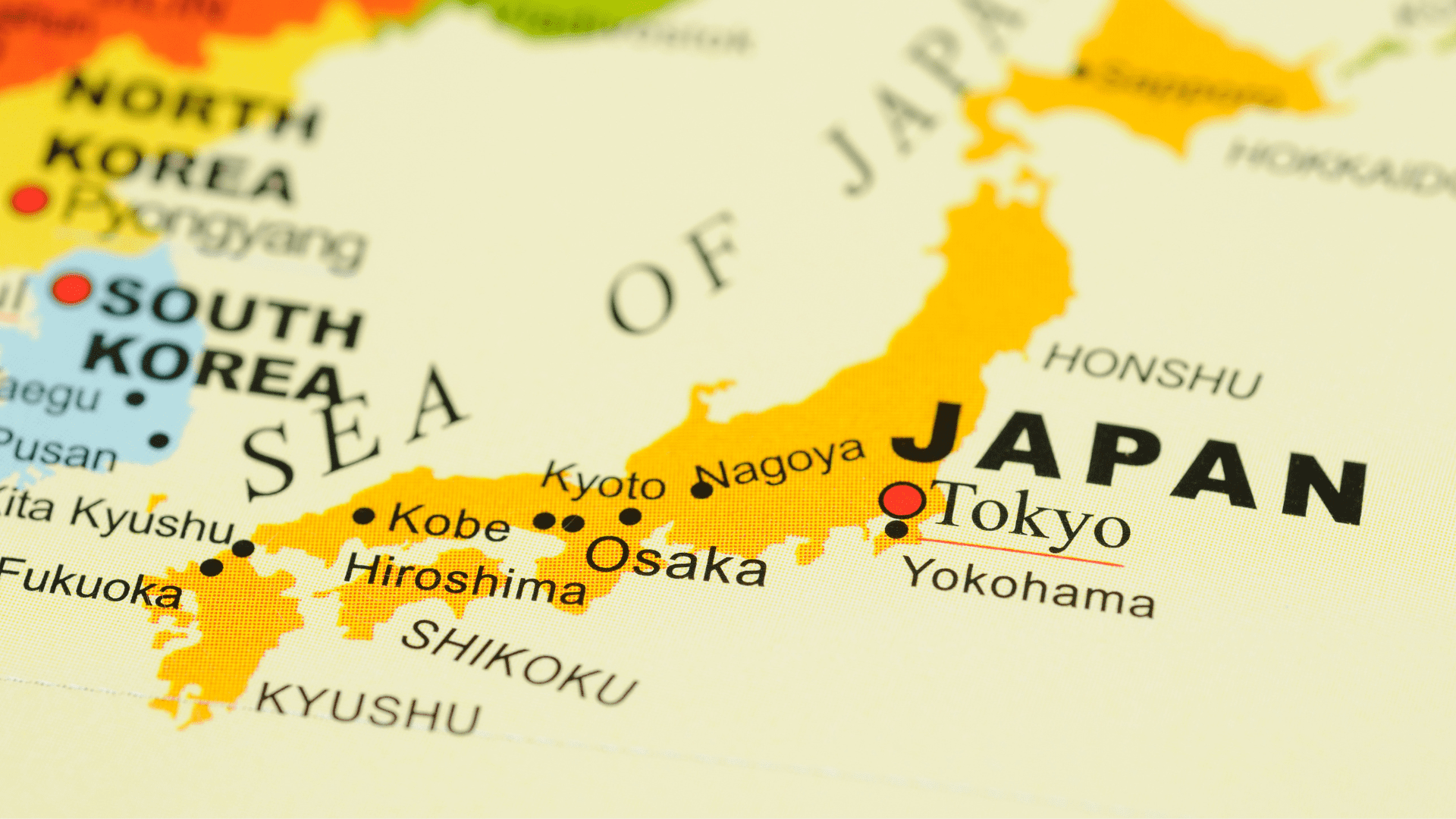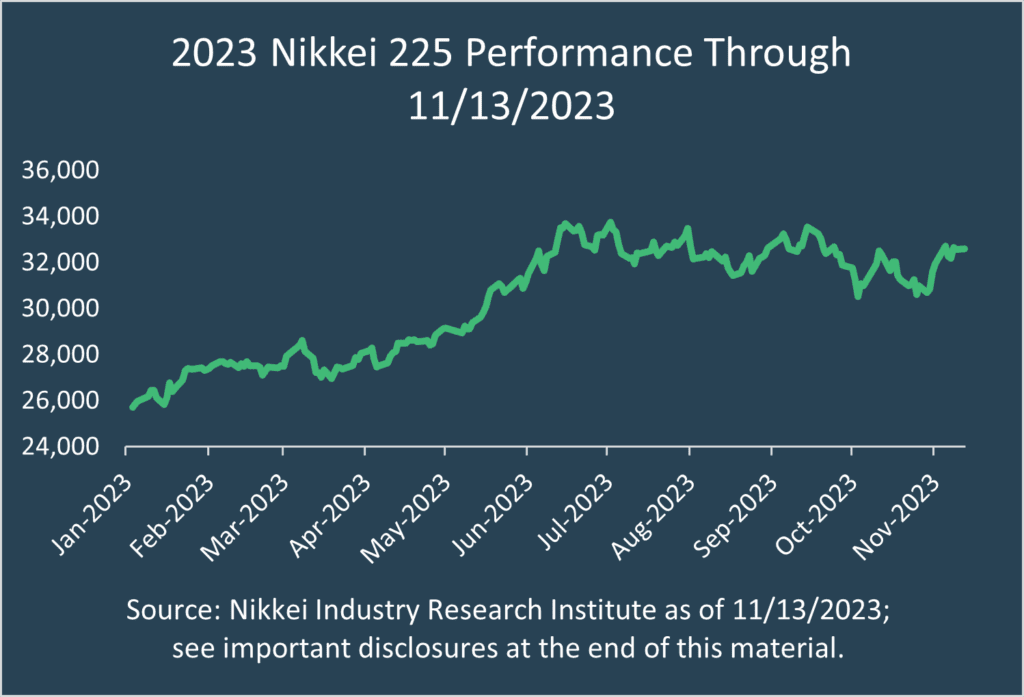By Rick Bettger, MBA – Investment Research Analyst
You might have to go all the way back to the 1980s to see a headline like the one that ran in the Wall Street Journal on October 4: “Japan is the most exciting market in the world.”[i] With the Nikkei 225 hitting 33-year highs over the summer and closing out October up more than 20% year to date in yen terms, Japanese stocks are flipping the low/no-growth script international investors became accustomed to over the past few decades.
By way of background, Japan’s post- World War II economic growth was nothing short of miraculous given the degree of rebuilding required. State-assisted capitalism, a surplus of well-educated workers, and a stable political situation with low military costs were just a few of the factors that helped the country recover quickly and grow rapidly into the world’s second largest economy.[ii] That growth peaked on December 29, 1989, when the Nikkei 225 closed at 38,195, its all-time high.
 [iii]
[iii]
Things changed dramatically when the Bank of Japan (BOJ) raised interest rates in the early 1990s. Twin equity and real estate bubbles burst and threw the country into a deep recession. The BOJ tried to stimulate the economy by implementing easy monetary policy featuring low or zero interest rates, but an extended deflationary environment took hold and the spiral of falling wages, appreciating yen, and surging government debt made it difficult to normalize policy.[iv] Additionally, Japan faced a number of hurdles in the ensuing years – increased global competition, economic disasters such as the great financial crisis, and the demographic challenges presented by having the world’s oldest population supported by a birth rate of only 1.3 – that contributed to muted growth and what some would call a “lost 30 years.”
In contrast, the growth seen in 2023 has been anything but muted and it’s sparking conversations amongst investors that haven’t happened in a long time. In drawing from those conversations, there appears to be several underlying factors to the recent surge that suggest Japan could be on a path to more sustainable growth in the longer term.
Structural Changes in the Tokyo Stock Exchange
The Tokyo Stock Exchange (TSE) made a splash in late March when it finalized market restructuring rules designed to encourage better corporate governance, improve relations with investors, and promote sustainable growth. These goals may sound familiar to many international investors: Abenomics, introduced by the late Japanese Prime Minister Shinzo Abe a decade ago, also sought to spur growth through a combination monetary policy, government spending, and structural reforms, including improved corporate governance.
As part of the changes, the TSE called on listed companies with price-to-book (P/B) ratios of less than one to either present plans for improving their business or explain the situation to investors. Non-compliant companies could face de-listing as early as 2026.
Investors responded enthusiastically and the Nikkei 225 shot up 19.1% from April 3rd to the YTD high on June 15th.
In simple terms, a P/B ratio that is consistently less than one means that the market is skeptical of a company’s future profitability and growth potential. Without that confidence, the market bids the stock price to a level that’s less than what the assets of the company are worth.
A large part of the resounding investor response may be due to the broad impact of the TSE’s request. In March, half of the most liquid “prime” listings, and about 60% of “standard” listings had P/B values that were less than one. [vi] While it remains unclear for now if companies will actually be de-listed from the exchange, it’s clear the initiative has already sparked corporate action as evidenced by the nearly 31% of Prime Market listings that made their disclosures by mid-July.[vii]
Though 2023 has been an exciting break from the Japanese equity script, it would be remiss of us not to step back and acknowledge the current surge could be the continuation of a longer-term story. As we review the returns of the Nikkei 225 since 1989 in chart 1, we note the current positive trajectory appears to have really started back in 2013 with the introduction of Abenomics.
Inflation
A robust economy consistently showcases modest degrees of inflation; to that point, post-COVID inflation was a good thing for Japan because it provided a catalyst for the country to exit its disinflation/deflation cycle. Our friends at Schroders described a healthy inflation environment and its relationship to Japan well:
Inflation is important. If companies can put through price increases, then they have confidence to increase wages. This translates into stronger purchasing power for households, leading to further increases in demand, which then leads to improving sales and profits for companies, etc. It’s a virtuous circle, but one that has been missing in Japan for many years, forcing companies to focus on cutting costs instead of raising wages or otherwise investing in their businesses.[viii]
Historically, Japanese consumers were averse to price increases, leading many Japanese companies to rely on lowering prices to capture additional market share and maximize profits. Recently, though, the Japanese consumer appears more open to price hikes as companies have passed on the higher costs of goods and materials without negative impact to growth or profits. [ix] This is a positive change that may be kickstarting a sustained, healthy cycle of inflation and growth in Japan going forward.
Importantly, the wage growth component of the circle may already be in motion as well. In July, major Japanese companies agreed to raise union wages an average of 3.58%, the largest wage hike since 1993.[x] With unemployment low and the Japanese work force aging, it stands to reason that wages will likely continue growing in the future as companies compete for workers from a shrinking talent pool in a tight jobs market.
Additionally, sustained positive inflation has the potential to change Japanese investment preferences.
International investors know well that Japanese households and corporations hold large amounts of cash. The root of this preference is complicated, encompassing post- World War II government regulations, an illiquid real estate market, and the prolonged experience of deflation where today’s cash is worth more tomorrow due to falling prices. [xi]
In contrast, the opposite is true where inflation causes today’s cash to be worth less tomorrow due to rising prices. This cost of holding cash, added to the cost currently imposed on savers by the BOJ’s negative interest rates, could spur households to invest in Japanese equities as they seek appreciation of their investments.
Trade, Economy, and Geopolitics Converging
While the intention of negative interest rates is to encourage cash deployment, Japan’s unconventional policy may pay off in another way. As most developed markets’ central banks raised interest rates to fight inflation, the BOJ maintained the negative rate policy it introduced in 2016. This contributed to a weaker yen, which raised the costs of importing raw materials – priming the positive inflation cycle that we previously discussed.
The weak yen also makes Japanese exports more attractive at a time when Western companies look to diversify supply chains away from China amid growing competition and geopolitical tensions.
Japan’s economy is the third largest[xii] in the world and boasts a proven manufacturing base with strengths in several key areas such as industrial automation equipment, sensors, battery technology, medical devices, and pharmaceuticals. [xiii] Additionally, Western countries recognize Japan as a market that respects the rule of law and provides strong protections for intellectual and real property rights – key factors that have many concerned about China.[xiv]
These factors appear to be paying off for Japan, as evidenced by Capital Group reporting that Japan’s government has brought in more than $14 billion in planned investments from companies in the U.S., Europe, South Korea, and Taiwan since 2021.[xv]
So what?
As analysts, we’re watchful for trends or situations that occur outside of the norm. So, when bold headlines about Japanese equities appear in the newspaper and recent discussions with portfolio managers involve their strategy missing out on strong Japanese equity growth, it draws our attention. In fact, all but one of our recommended managers maintained an equal or underweight allocation to Japan – based on the long-term history of the Japanese equity market and a given manager’s investment style, a wait-and-see or a skeptical approach is understandable. After all, international investors have seen Japan go through fits and starts as various initiatives tried to jumpstart sustainable growth in the past three decades, such as the initial exuberance following Abenomics’s announcement that tapered off.
At this point, continued strong growth is by no means a slam dunk and a number of risks exist. For example, the BOJ recently signaled a desire to begin normalizing monetary policy; higher interest rates usually dampen equities growth. Another risk could be the negative effect on investor sentiment if the TSE does not back up its threat to de-list non-compliant companies, which is the key tool to enact corporate governance reforms. It’s also possible Japanese consumers revert to their previous aversion to price increases, causing companies to return to a price cutting spiral.
In light of these risks, the analysts and portfolio managers we’ve spoken to remain cautiously optimistic about the Japanese market and take encouragement from the corporate governance reforms and the improved dialogue they’ve already experienced with corporate management teams.
Looking ahead, Japan has a lot of opportunity in front of it. Already home to top manufacturing and robotics firms, the Japanese government recently announced initiatives to expand computing power to support AI development and to strengthen its semiconductor industry. Coupled with the underlying support factors we’ve discussed here – positive structural changes, a healthy degree of inflation, and being in the right place at the right time – a path to more sustainable growth appears to be open to Japan.
Regardless of the outcome, this year’s strong growth forced a renewed positive focus on the world’s third largest economy and sparked conversations amongst investors that have not occurred in a very long time.
Sources:
[i] https://www.wsj.com/finance/stocks/japan-is-the-most-exciting-market-in-the-world-181b5b80?st=k3hojewppvcjk9r&reflink=desktopwebshare_permalink
[ii] https://spice.fsi.stanford.edu/docs/learning_from_the_japanese_economy#1
[iii] Nikkei Industry Research Institute, Nikkei Stock Average, Nikkei 225 [NIKKEI225], retrieved from FRED, Federal Reserve Bank of St. Louis; https://fred.stlouisfed.org/series/NIKKEI225, November 13, 2023.
[iv] https://www.lordabbett.com/en-us/financial-advisor/insights/markets-and-economy/at-last–the-sun-rises-on-japanese-equities.html
[v] Nikkei Industry Research Institute, Nikkei Stock Average, Nikkei 225 [NIKKEI225], retrieved from FRED, Federal Reserve Bank of St. Louis; https://fred.stlouisfed.org/series/NIKKEI225, November 13, 2023.
[vi] https://www.cnbc.com/2023/06/13/investing-is-japan-inc-finally-serious-about-corporate-governance-.html
[vii] https://www.schroders.com/en-us/us/intermediary/insights/has-japan-s-stock-market-resurgence-run-out-of-steam-/
[viii] https://www.schroders.com/en-us/us/intermediary/insights/has-japan-s-stock-market-resurgence-run-out-of-steam-/
[ix] https://www.lordabbett.com/en-us/financial-advisor/insights/markets-and-economy/at-last–the-sun-rises-on-japanese-equities.html
[x] https://www.reuters.com/markets/asia/japans-firms-offer-biggest-pay-hikes-30-years-wage-growth-broadens-2023-07-05/
[xi] https://www.frbsf.org/banking/asia-program/pacific-exchange-blog/why-do-japanese-households-hold-so-much-cash/#:~:text=In%20the%20years%20following%20World,these%20savings%20into%20bank%20deposits.
[xii] https://kpmg.com/de/en/home/insights/overview/economic-key-facts-germany.html
[xiii] https://www.capitalgroup.com/advisor/insights/articles/japan-reforms-stock-valuations.html
[xiv] https://trade.gov/country-commercial-guides/japan-market-overview
[xv] https://www.capitalgroup.com/advisor/insights/articles/japan-reforms-stock-valuations.html
DISCLOSURES
© 2023 Advisory services offered by Moneta Group Investment Advisors, LLC, (“MGIA”) an investment adviser registered with the Securities and Exchange Commission (“SEC”). MGIA is a wholly owned subsidiary of Moneta Group, LLC. Registration as an investment adviser does not imply a certain level of skill or training. The information contained herein is for informational purposes only, is not intended to be comprehensive or exclusive, and is based on materials deemed reliable, but the accuracy of which has not been verified.
Trademarks and copyrights of materials referenced herein are the property of their respective owners. Index returns reflect total return, assuming reinvestment of dividends and interest. The returns do not reflect the effect of taxes and/or fees that an investor would incur. Examples contained herein are for illustrative purposes only based on generic assumptions. Given the dynamic nature of the subject matter and the environment in which this communication was written, the information contained herein is subject to change. This is not an offer to sell or buy securities, nor does it represent any specific recommendation. You should consult with an appropriately credentialed professional before making any financial, investment, tax or legal decision. An index is an unmanaged portfolio of specified securities and does not reflect any initial or ongoing expenses nor can it be invested in directly. Past performance is not indicative of future returns. All investments are subject to a risk of loss. Diversification and strategic asset allocation do not assure profit or protect against loss in declining markets. These materials do not take into consideration your personal circumstances, financial or otherwise.




